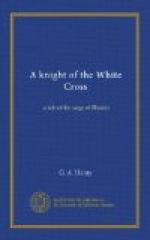Several of the Turkish galleys, in their efforts to arrest the approach of the fire ships towards the bridge, became themselves involved in the flames; but they were so far successful that when daylight broke the bridge was still intact and the combat at the breach continued to rage with determination and fury on both sides. The Turks there were led by a brave young prince named Ibrahim, a near relative of the sultan, with whom he was a great favourite, and he was ever in the front line of the assailants, his splendid bravery animating the soldiers to continue their efforts. As the daylight broadened out, however, the light enabled the Christian gunners to aim with far greater accuracy than had before been possible, and, concentrating their fire upon the bridge, across which reinforcements continued to press to the support of the assailants, they succeeded in sinking so many of the boats that it was no longer passable.
Next they turned their fire upon the Turkish galleys, four of which they sank. Shortly afterwards, a ball struck the gallant young leader of the Turks, who, although previously several times wounded, had continued to fight in the front line. He fell dead, and his followers, disheartened by his fall and by the destruction of the bridge, at once abandoned their efforts, and rushed down to the foot of the breach. The terrible scene enacted at the repulse of the previous attack was now repeated. The concentrated fire of the guns of the defenders carried destruction into the crowded mass. Some gained the boats that still remained uninjured, and rowed for the opposite shore; the greater number rushed into the water and strove to recross it either by swimming or by the aid of the debris of the shattered boats. Their total loss was greater even than that suffered by them in the first attack, between two and three thousand being either killed or drowned, among them a number of their best officers. The amount of spoil, in the form of rich jewels and costly gold ornaments, found on the bodies of the dead piled on the breach, was very great.
For three days after this terrible repulse the Turks were inactive, the pasha remaining shut up in his tent, refusing to see any one, or to issue orders. At the end of that time he roused himself from his stupor of grief and disappointment, and, abandoning the idea of any further attack upon the point that had cost him so dearly, he ordered the troops to move round and renew the attack upon the wall in front of the Jews’ quarter, and commence the construction of a battery on the edge of the great ditch facing the retrenchment behind the breach before effected. The knights of Italy and Spain determined to seize the opportunity of retrieving the disgrace that had fallen upon them. At night they descended into the deep cutting, carrying across their ladders, and, silently mounting the opposite side, rushed with loud shouts into the unfinished battery. The Turks there, taken utterly by surprise, made but a slight resistance; a few were immediately cut down, and the rest fled panic stricken.




